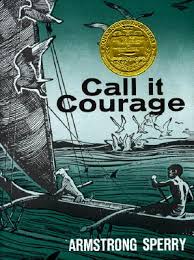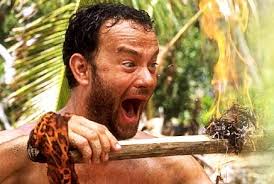 Call It Courage, by Armstrong Sperry, continues my run of “boy comes
of age” books. Our hero, a Polynesian boy of about 12 years of age, becomes
known in his community as a coward. In a culture that lives mere feet above sea
level and depends on the sea for food and travel, Mafatu is afraid of water. He
does not go out to fish like the other boys his age. He sits on the shore with
the (oh horror of horrors) women and girls. Thus he learns net-making, net-mending,
how to make tools from bone.
Call It Courage, by Armstrong Sperry, continues my run of “boy comes
of age” books. Our hero, a Polynesian boy of about 12 years of age, becomes
known in his community as a coward. In a culture that lives mere feet above sea
level and depends on the sea for food and travel, Mafatu is afraid of water. He
does not go out to fish like the other boys his age. He sits on the shore with
the (oh horror of horrors) women and girls. Thus he learns net-making, net-mending,
how to make tools from bone.
Mafatu’s fear is attributed to a horrific experience he had
as a child, in which his mother died. The gods of Mafatu's culture are active
and personal; Mafatu hears the sea god calling to him…that he was supposed to
die too and the god will make sure it happens. In addition to the gods, Mafatu
feels pressured by family ties. His father is a hereditary chief—how will his
fraidy-cat son carry on the family tradition of honorable leadership? Mafatu
knows that he is a disappointment as well as a joke.
 In a scene oddly reminiscent of “Rudolf the Red-Nosed
Reindeer,” Mafatu overhears other boys talking about him, calling him a coward,
and deciding to exclude him from their “games” (activities). In response, Mafatu takes off alone in a
canoe. He doesn’t care anymore. Let the sea god take him.
In a scene oddly reminiscent of “Rudolf the Red-Nosed
Reindeer,” Mafatu overhears other boys talking about him, calling him a coward,
and deciding to exclude him from their “games” (activities). In response, Mafatu takes off alone in a
canoe. He doesn’t care anymore. Let the sea god take him.
What follows is the story of how Mafatu recognizes his own
strengths and courage as he struggles to survive first on the open ocean and
then on the island upon which he lands. Like Tom Hanks in Cast Away, Mafatu must
master hunger, thirst, fire, shelter, safety, and loneliness. Mafatu has an advantage in the loneliness department.
His faithful dog has traveled by his side all the way. Mafatu also tamed an
injured albatross, which follows him and occasionally guides him (especially
toward home). The two animal associates validate Mafatu early on as a hero. We
know that no ordinary boy would have such loyal friends.
 Call It Courage is a small book and a quick read. It was awarded the Newbury medal in 1941. The text
presents many native words in context gives the flavor of pre-colonial
Polynesian life. However, I cannot verify the authenticity of the culture
described. Perhaps it is oversimplified or romanticized. It didn’t feel that
way. Certainly the land/seascapes were beautifully drawn—the vastness of the
ocean, the surf and sand, the description of life on a coral reef. The boiling
sun was over-present until a storm raged and I wanted it back. The author’s
love of the islands saturates the writing.
Call It Courage is a small book and a quick read. It was awarded the Newbury medal in 1941. The text
presents many native words in context gives the flavor of pre-colonial
Polynesian life. However, I cannot verify the authenticity of the culture
described. Perhaps it is oversimplified or romanticized. It didn’t feel that
way. Certainly the land/seascapes were beautifully drawn—the vastness of the
ocean, the surf and sand, the description of life on a coral reef. The boiling
sun was over-present until a storm raged and I wanted it back. The author’s
love of the islands saturates the writing.
Side Bar: Would you or wouldn’t you?
 Would I survive such an experience as Mafatu’s? When I
imagine myself marooned on an island or trapped on a mountaintop, abandoned in
the ocean or in outer space, I have the feeling that I would not be a
triumphant survivor. My survival skills mostly involve writing, not foraging. I
might be able to figure out a shelter of some kind. (I’ve read enough books to
know how it’s done fictitiously.) And I could probably do OK with loneliness.
But I would be lousy at making a fire and keeping it going. And I’m lousy at
weapons. In other words, I’m pretty much doomed.
Would I survive such an experience as Mafatu’s? When I
imagine myself marooned on an island or trapped on a mountaintop, abandoned in
the ocean or in outer space, I have the feeling that I would not be a
triumphant survivor. My survival skills mostly involve writing, not foraging. I
might be able to figure out a shelter of some kind. (I’ve read enough books to
know how it’s done fictitiously.) And I could probably do OK with loneliness.
But I would be lousy at making a fire and keeping it going. And I’m lousy at
weapons. In other words, I’m pretty much doomed.
I enjoy these would-you/wouldn’t-you questions. Like, if you
knew the world would end in one week, would you try to survive? Would you just
eat some cyanide? We really can’t know and I suspect that my guesses would be
useless. There may be more than the two or three scenarios I imagine. A friend and I
who quit smoking around the same time made an agreement that if we found that
the world really was going to end, we would be allowed to smoke again—it wouldn’t
matter anymore. But, having been smoke-free for many years now, I doubt that I
would smoke at all. I wouldn’t meet the end with a butt on my lips. Why? Why
not? What difference would it make?
 I often wonder, too, if I would be one of those people who
evacuates from a hurricane ahead of time or whether I would decide to sit it
out. This was an easier question before I had pets. I would want to get the
cats and dog to safety even if I wanted to stick around. Again, not much
rational thought goes into this decision making process and in the actual event,
I have no idea what I would do.
I often wonder, too, if I would be one of those people who
evacuates from a hurricane ahead of time or whether I would decide to sit it
out. This was an easier question before I had pets. I would want to get the
cats and dog to safety even if I wanted to stick around. Again, not much
rational thought goes into this decision making process and in the actual event,
I have no idea what I would do.
I also ponder questions about what I would do to survive. I’ve
already decided that I would never kill another person, but that’s in the
abstract. If my loved ones’ lives were threatened, would I kill or let them
die? There’s a great Star Trek NexGen episode about this.
Would you or wouldn’t you? I guess we’ll have to wait and
see…